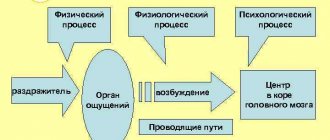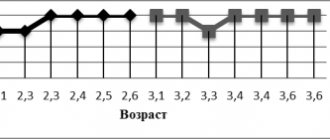Part 1. Subjectivity.
A man is born. Source - Esoterics. Living Knowledge
A person begins to understand the world.
Nature has endowed us with the abilities to hear, see, taste, smell, touch, experience emotions, think... It seems like she forgot nothing?)
Perhaps emotions and thoughts could be combined into one, as a product of brain activity...
Or add extrasensory abilities or something else...
Or exclude something...
But I propose to leave it this way, because the number of our tools for understanding the world does not play a significant role in this case. All that matters is that a person receives information through the tools available to him. There are no other ways to obtain information.
And he gains personal experience thanks to these instruments of his, and a person also cannot gain the experience of other people by bypassing this HIS perception.
Even insights and enlightenment come in the form of thoughts or in the form of sensations.
My experience is that the world does not revolve around me.
He lives his own life.
And I have a feeling that the objective world exists...
BUT: the same experience tells me that I don’t have and, most likely, won’t have any other way to know reality except through my perception. The experience of meditation, connecting with the world, imagining oneself in the place of another person, studying literature, conversations with smart people - all this is accepted by me, accepted through the same tools and nothing else.
I choose which information is considered true and which is false (or this happens automatically, unconsciously). But it happens inside of me.
I choose who to listen to more closely on issues that interest me, who to listen to with half an ear, and who not to listen to at all. I choose the books I read and the people I consider my teachers. We can say that they come on their own... And other people significantly influence my choice, my perception... But be that as it may, in the end, all the acceptance of information and all its processing occurs within me, with the help of the tools I have , based on information received and systematized by me earlier.
I can consciously make an effort to learn the situation from as many sides as possible, to consider as many different options as possible... My choice from this may seem objective and impartial to me... But this still will not save me from subjectivity.
Realizing this to myself, I understand that everyone else is in the same position. I am interested in learning the views and opinions of other people, because they enrich my picture of the world, but at the same time I understand that, no matter how hard I try, I do not hear exactly what they say, but only what I am able to hear and understand.
The perception of information goes through many filters - mood, attitudes, past experience, accumulated information, social stereotypes and many others.
Information has some percentage of reliability, but it is never one hundred percent. At the same time, this reliability is enough for making conscious decisions, for normal functioning in the world. Assumptions are made, confirmed or refuted, constantly clarified and refined, information is accumulated and processed, organized and systematized.
Based on this, an idea of the world is formed.
And this idea is consistent with experience, consistent with personal logic, consistent with all available information. On open questions, on questions that need clarification and improvement, there is a more active collection of new information, and more attentive... On questions that have internal confirmation of reliability, he practically stops.
Understanding this about myself, I understand the same about others.
It makes no sense to convince a person of something who has formed a point of view on a certain issue. The declaration of one’s own experience, one’s own knowledge, one’s own authorities is broken by the experience, knowledge and authorities of another person. His picture of the world is as valid as mine. Neither one nor the other fully reflects the real, objective world, but both of them were not formed out of nowhere, but became the result of a life lived.
A person seeking can hear and perceive what I say if he perceives me as a source of reliable information, if I inspire his trust. Otherwise, disputes and discussions are empty and meaningless.
There is an opportunity to earn trust by listening and being heard. Go from the experience of another person, and not from your own, from his authorities. In this case, you can help him find discrepancies within his system and help correct them. Or you can suggest what to add to the system or what to exclude to improve the overall quality. But DO NOT convince him of his attitudes.
NOT to say - your system is no good. Take mine. She's perfect.
First of all, it's useless. Secondly, it gives nothing but conflict.
***
It would be very cool, in my opinion, if people really understood and accepted this)
Then you could safely share your ideas about the world, big and small, calmly, confidently and openly, without fear of condemnation and ridicule, without creating disputes and conflicts.
Show your world on an open palm and look at other people’s outlandish worlds, logical and chaotic, sad and cheerful, very, very different...
That would be very cool!)
Objective perception
One of the most interesting facts is that we have no idea about the objective world around us, and we cannot even confidently say whether the world around us exists or not. Only the world or phenomena that do not depend on our perception can be called objective; therefore, the objective is something incomprehensible.
For a person, there is no reality outside of his perception. Our entire reality is what we were able to perceive with our senses.
There is a certain effect that is captured by our senses and then interpreted by our brain.
The uniformity of images perceived by a person can only speak of the uniformity of the organs of perception and interpretation of incoming sensations.
It is impossible to separate the perceiver from the perceived. From the point of view of human perception, a person with his senses and the world perceived by him are something united and inseparable.
Man has invented numerous devices that allow him to expand the range of perceived phenomena, capturing that part of the world that is inaccessible to his ordinary senses. For example, radio waves, infrared radiation, etc.
However, in any case, we perceive information through the eyepieces of microscopes or from monitor screens using our senses. The subjectivity of perception remains.
At the same time, one cannot talk about the absence of the world outside man, but only about its incomprehensibility by man.
Moreover, how much our perception changes the original signal can be judged by analyzing, for example, the sequence of human processing of sound signals.
Ear structure
I give an example of the sequence of human sound processing here not in order to broaden the reader’s horizons in anatomy, but to show how much the initial signal in the form of air vibrations changes on the way to the brain, where it is converted into a finished form.
This is how sound waves are initially captured by the auricle. Then they are directed along the ear canal to the eardrum. The eardrum converts sound pressure into vibrations that are transmitted to a number of bones. Each of the bones: hammer, anvil, stirrup carries out a certain transformation of incoming vibrations. Next, the signal enters the oval window, and the signal transmission transitions from a gaseous medium to a liquid one. The signal then passes through the cochlea (a spiral-shaped organ), which converts the signal into electrical (nerve) impulses. The signals then travel through the nervous system to the brain. The brain somehow interprets the received signals into images.
With so many transformations, how much does the final image deviate from the original signal?
Thus, we can only say that there is something that affects the sense organ, in this case the ear, but we cannot talk about what it is and whether it exists outside of a person.
Part 2. Egocentrism.
So man is subjective.
It is initially designed in such a way that it is in itself.
And he is closer to himself than anything else.
To our own benefit, we act, one might say, automatically.
Subject to your desires, your pleasant and unpleasant feelings.
Society, starting with parents and continuing with other teachers, teaches that we must take care not only of ourselves and our interests, but also of the people around us and their interests.
At this stage, different people receive different information about how to behave for a happy and successful life, whose interests should be taken into account, whose can be neglected... And people also receive different explanations for why they should behave this way and not otherwise.
Some are told and shown that it is good and pleasant to be kind, others that you need to do something for others only if you need something from them and can get something from them, others are told about hell and heaven, which will be the result of actions, to someone that it is good and honorable to be an altruist, but to be an egoist is bad and condemned...
In addition, a person receives information about different ways and results of interaction with other people and through personal contact experience. Which also works out differently for different people.
As a result of the experience and knowledge gained, a personal model of behavior is developed that seems most correct to a person. Whatever it may be, selfish or altruistic, they have one thing in common - a person chooses this model of behavior based on his (!) own interests.
When performing actions for other people, a person either receives pleasure from it, or expects to receive gratitude from the person for whom these actions are performed, or recognition from third parties, from society, from God. Altruism gives the status of a good person in society, the ability to look down on the bad ones. It gives you the opportunity to become a hero and become famous. Or not to become famous, but to feel great, capable of self-sacrifice, which can be much more valuable than external recognition. It makes it possible to avoid the condemnation that egoists are subjected to.
Where am I going with this?
Because all people are selfish.
And altruism is also such egoism, only different)
This means there is no particular reason to be proud of yourself and your choice. You, having your knowledge and your experience, chose the best for yourself (!), and the other person also chose the best for himself. You are no better or worse than another, you are just different, and your lives are different, and your decisions in life are also different.
Convicting anyone is baseless.
Maybe if you had lived the life of that other one, you would have been even worse than he was...
Next point. Disputes about how to live correctly.
When everyone follows the same rules of behavior in society, life becomes much easier, it gives a feeling of security and confidence. Similar ideas about the world make it easy and simple to negotiate with other people. It is for this selfish purpose that we bring our ideas about the world into the world, convincing others to believe in the God we believe in, to adhere to the religion that we adhere to, or not to believe in anything because we do not believe. Other, alien attitudes are inconvenient for us. So we tell you how good our own are.
Of course, there is also a desire to help when a person is unhappy and seeks help. But if they don’t ask for help, if another person is satisfied with his model of the world, for what purpose do atheists persuade believers to stop believing in God, and believers convince atheists to believe?
In my opinion, only personal egoism is the reason for this.
So, all people are self-centered.
They act from their control center, their Self, and in their own interests.
And in this we are all equal.
Research activities
Kozhemyako V.S. Teacher of Russian language and literature, head of department. A person cannot exist in the world without learning to navigate it. Orientation depends on people’s ability to adequately comprehend the world, correlating knowledge about it and knowledge about themselves. Those phenomena and processes to which people's cognitive activity is directed are usually called the object of knowledge, and the one who carries out cognitive activity acquires the status of a subject of knowledge. Literature, as an integral part of our life, is also a subject of knowledge and, accordingly, two forms of perception of a literary work inevitably arise - objective and subjective - mutually complementing and enriching each other. If we look into the philosophical dictionary, we will see that “... the concept of objectivity presupposes two main meanings: 1) that which exists independently of the subject; 2) what is universal and generally accepted." In relation to literature, to a literary work, we can say that the objective in the perception of a literary work is that which exists a priori, independent of the reader - that is, the work itself as such, as a given, the author’s position, which also does not depend on the reader, but as well as thoughts and ideas declared in this work. Any literary work has such an objective side; it doesn’t even require proof. But since the very existence of literature is impossible without a reader, then, accordingly, it is impossible without subjective perception. Perceiving a literary work subjectively, the reader projects the questions raised and the events described onto his personal inner world, onto his experiences, onto his purely personal worldview. Thus, the perception of a literary work consists of two aspects: the objective information presented in the work, and the subjective perception of this same information. One is impossible without the other, only the predominance of one over the other is possible, depending on many factors: the age of the reader, his worldview, his state of mind. Undoubtedly, one of the tasks of teaching literature at school is to teach the student, the young, beginning reader, to find that necessary compromise between the objective and subjective in the perception of a work, which will be optimal for the most complete understanding of the book. How to teach this at school? It is no secret that in this matter one cannot use the method of simple mechanical transmission of information. Even in ancient times, it was known that knowledge cannot be transferred from one person to another through mechanical assimilation of information. “Wisdom cannot flow from one who is full of it to one who is empty, just as water flows along a woolen thread from a full vessel to an empty one,” as Plato wrote in the Symposium. Knowledge must fall on “prepared” soil. The student should not perceive the learning process as a system of imposing on him a certain amount of knowledge, a considerable part of which he considers unnecessary, and often simply useless. A modern schoolchild, perhaps due to the changed situation in society, when the ability to find quick and sometimes non-standard solutions is becoming increasingly important, strives (consciously or unconsciously) in the classroom not just to receive information, but to see its relevance for himself personally. What is this relevance for a modern schoolchild, in particular a high school student? Firstly, the opportunity to express one’s personal assessment of a particular fact, event, one or another historical figure or literary character. Secondly, the opportunity to acquire practical skills necessary in modern life, namely: the ability to competently construct a monologue, the ability to participate in a dialogue or discussion, convincingly proving one’s point of view. Thirdly, the opportunity to acquire those practical skills, the need for which he has no doubt. The teacher, for his part, also sets himself a number of specific tasks, which are the main goal of his teaching activity. First of all, the teacher must offer students a certain amount of information corresponding to the basic curriculum. In addition, the teacher must monitor and evaluate the level of mastery of the material. At the same time, it is intended to awaken in students the desire for further self-education, or at least the desire to learn at least something beyond the scope of the school curriculum. The most important and, undoubtedly, very difficult task of modern pedagogy is to find ways to combine or at least bring these two directions closer to each other: “want”, “interesting”, “useful” of the student and “need”, “necessary” and “useful” ” of the teacher, to combine the student’s desire to express his subjective perception of the work and the teacher’s desire to attract the child’s attention to the objective side of the issue. It is well known that the purpose and essence of education consists not only and not so much in the transfer of a basic minimum of information, which the student sometimes cannot find application for, but in the development of the student’s personality. Therefore, training should be not only informative, but also developmental. The goal of such developmental education is the development of the student’s abilities, the development of his own beliefs and life principles, “free self-determination,” as A. Disterweg puts it, the development of creative abilities and, as a result, the formation of an independent personality capable of adapting to the modern world. Among the fairly large number of subjects included in the school curriculum, literature occupies a very special place. Perhaps because it is literature that provides the most comprehensive understanding of the cultural heritage of mankind. It is this subject that provides the most extensive opportunities for work towards the development of the student’s personality. After all, literary works not only record information, but also contain an emotional, psychological assessment of certain events. This makes it possible for the student not only to get acquainted with the point of view on a particular problem or event characteristic of a particular time, but also to build his own rating scale, to project his subjective value system onto a certain historical event or person. But, in an effort to make a literary work more understandable and accessible to a modern schoolchild, one must not stoop to primitivization, excessive simplification, which boils down to an exclusively personal, subjective assessment of the work. It is no secret to any working practicing teacher that the perception and interpretation of works of classical Russian literature by modern schoolchildren often not only do not coincide by any criteria with traditional, familiar ones, but also differ from them radically, fundamentally. And this cannot be ignored. It is impossible, of course, to turn the denial of an established, traditional point of view into the main goal, to cultivate in children an absolute, unreasoned denial of any classical interpretation. But we should not forget that over the decades, and sometimes centuries, that have passed since the creation of this or that literary work, the system of cultural, ethical, moral and social values has undergone a number of significant changes. This is a natural process that is almost impossible to stop or correct, and probably not necessary. It just needs to be taken into account when looking for ways and means to bring works of classical literature closer to the souls and minds of modern teenagers. Experience shows that schoolchildren, especially high school students, for whom the simple “must” argument, which works in elementary and middle grades, is no longer enough, better and more willingly perceive and analyze works in which they can find a problem, a question that is relevant specifically for them and specifically Now. For example, they are much less concerned about the problem of revolution than their peers, say, in the first half of the twentieth century, since this is not their problem, this issue does not affect their inner world. But the relationship between two generations, the problem of “fathers and sons” is something that worries every teenager every day. Consequently, it is necessary to largely reconsider the approach to the methodology of teaching literature. First of all, the student needs to be interested in the work or the personality of the author, trying as much as possible to bring the subjective perception closer to the objective picture. What exactly is decided by the teacher in each class and in each case. For example, as a rule, tenth graders are not enthusiastic about N.G. Chernyshevsky’s novel “What is to be done?”, but the personality of the writer himself rarely fails to arouse interest. This means that in this case, you can “go from the author”, showing children that any writer, regardless of how many years ago he lived, was the same person as them. He loved, suffered, made mistakes, he was worried about a variety of issues, some of which worry them themselves, thereby “layering” the objective onto the subjective. Let Chernyshevsky become for them not just a “revolutionary-minded writer”, this is a set of almost meaningless words for a modern high school student, but a person who wrote a novel about painful things, about what he thought, dreamed about, but could not say due to various circumstances . You can think of a lot of different ways to go from the personality of the writer to his work. At the same time, it seems to me that there is no need to be afraid to address the realities of modern life. For example, you can invite children to write not a traditional summary, but to come up with and compose an announcement or advertisement. Let them advertise the novel in such a way that classmates would want to read it or at least look at it, which, given the current global dislike of reading, would already be an achievement. But children will only open up to a teacher who sincerely wants to understand them, who is ready to share or at least discuss their point of view with them. Then the “fear of making mistakes” disappears, the fear of appearing funny or absurd. Consequently, there is a desire to prove and defend one’s point of view, and this requires arguments and the skill of competently constructing a monologue. The art of argument can only be understood through practice: one cannot theoretically teach one to participate in dialogue. This is a process of trial and error. And the main, very difficult task of the teacher is to direct the dispute, dialogue in the right direction, to adjust, as necessary, behavior, vocabulary and emotional intensity. It happens that the children’s point of view forces the teacher, if not to change, then at least to adjust his usual, traditional perception of this or that hero, this or that problem. And there is no need to ensure that the children certainly take the “necessary” position, from the teacher’s point of view. It is important that they learn to treat it with respect, take it into account, and reckon with it. After all, we ourselves are not always ready to accept our children’s point of view on this or that modern work; we do not always cope with the temptation to call them unworthy nonsense, nonsense and not literature at all. While the modern teenager sees in this “nonsense” some global problems that are sometimes incomprehensible to us, which are extremely interesting to him. If we do not respect their tastes, their books, their films, then why do we expect understanding in return? By reviewing traditional approaches to teaching literature in high school, focusing on the student’s personality, his subjective perception of a literary work, and teaching him to adequately evaluate the objective side of the work, one can achieve awareness of learning. In this way, it is possible to take certain steps towards the formation of a personality capable of an adequate, competent and moral assessment of works of literature.









